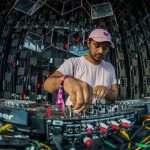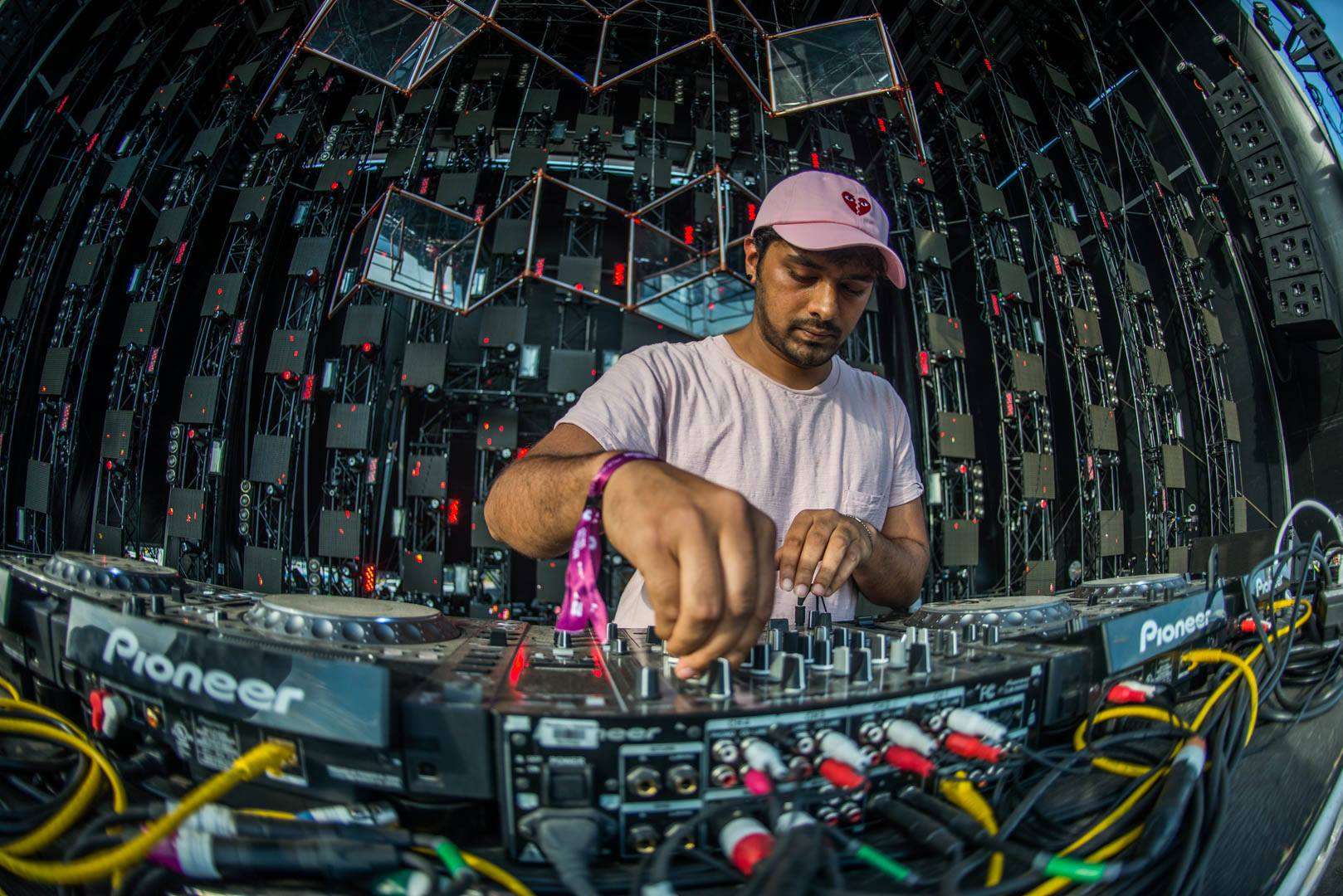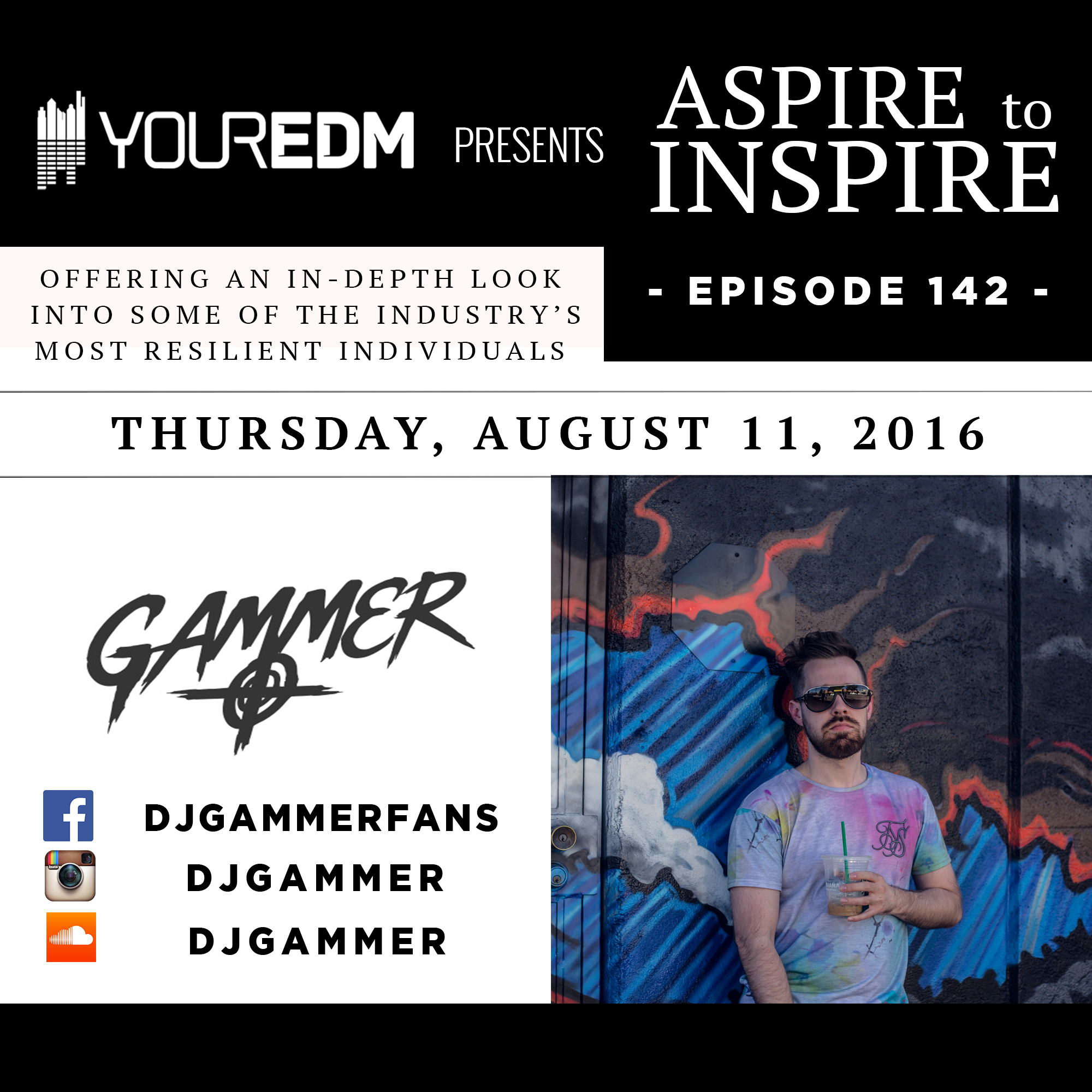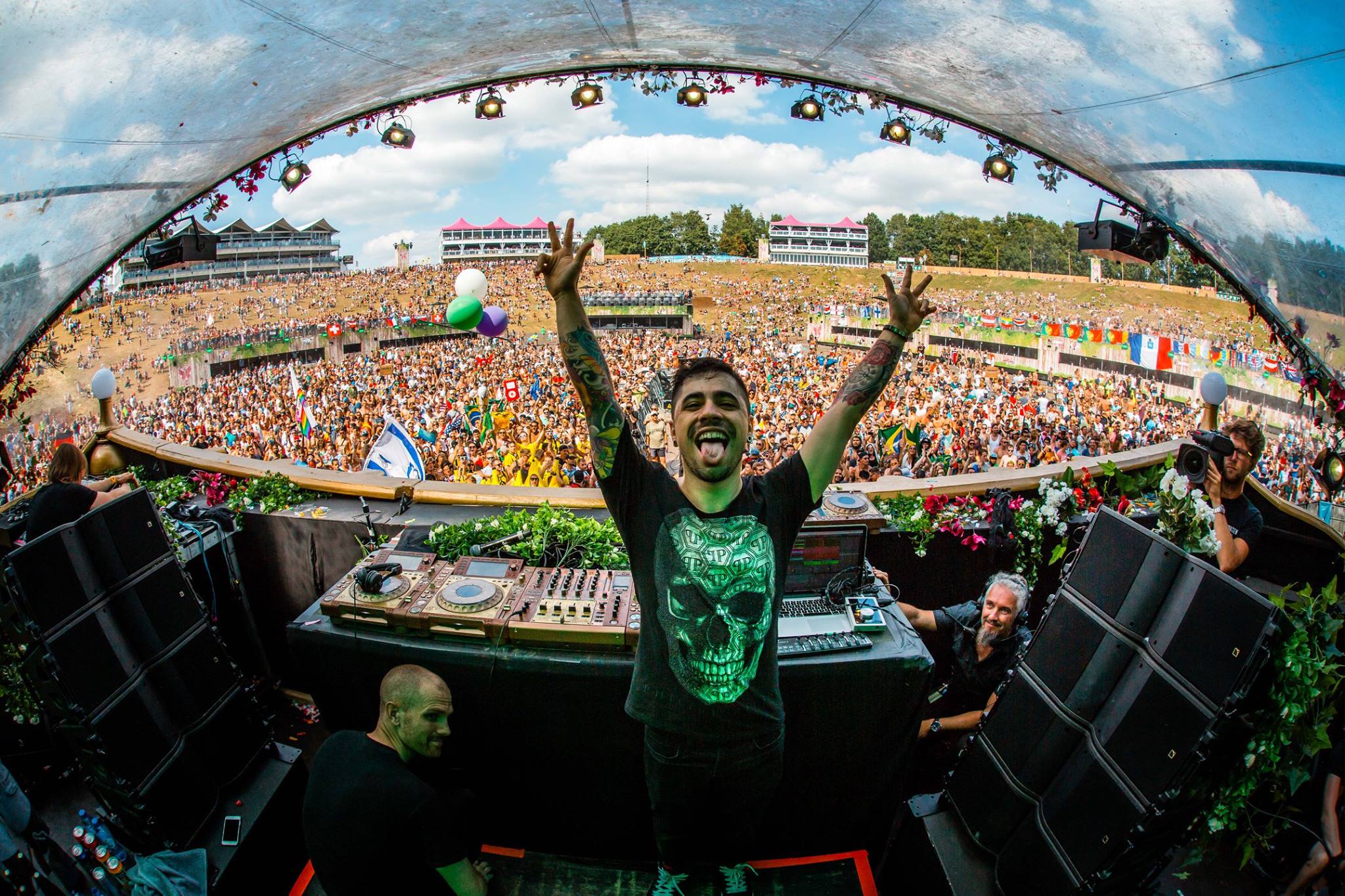It’s been nine months since I last spoke to Jai Wolf in person, known to his friends and family as Sajeeb Saha, and even though he himself was no different, his musical career couldn’t be more polarized. Though nine months ago he was already on the path to success, having opened for ODESZA on the duo’s In Return tour, and breakout single “Indian Summer” had already made waves across the blogger community, he was only still starting to scratch the surface of mainstream success.
Fast forward to now and Jai Wolf is a household name in both the future bass community and beyond. Sajeeb has wowed the crowd with a stellar performance at VELD 2016, but already he’s looking ahead to the next one. “I can’t wait to play HARD tomorrow man!” he says. There’s a distinct ‘always look ahead’ kind of mentality with Sajeeb which has propelled him from SoundCloud to becoming a full-fledged touring act – one of the many topics we covered over a rapid-fire twenty minute discussion in his trailer, including ODESZA’s influence, hard work, being one of the few Asian-Americans in EDM and more.
Going from a SoundCloud act to a touring act can’t be easy, how was the transition?
It’s just crazy because we started doing smaller rooms and I think Jai Wolf just clicked for a lot of listeners and snowballed into something larger. I think that this year people kind of realized that Jai Wolf was this sort of a “movement” because our first LA show sold out in a day, the second in 10 minutes, third in 3 minutes. We just wanted to see what we could do so we did a 500 cap room and tried to see if we could sell it out in a day, same in NY and SF, and multiple nights, and that’s when we knew that they didn’t just like the music, but the culture behind it to – feeling vulnerable in the moment and feeling connected to emotional melodies, which is the staple behind Jai Wolf. It’s cool to see that so many people can connect with all these melodies because it’s how I feel in my head translated to music. It’s awesome to see that people can resonate with that and then come out to the shows and support. It’s truly a magical sort of feeling.
Was there a moment where you knew you made it? What was that like?
When I played Santa Ana at Yost I stepped outside and was mobbed which was weird, especially because I was still a SoundCloud person at the time. Even now I find it strange and surreal when I get approached like that. I still write music at my parent’s house, I’m still stuck in a basement writing my music all day, and it’s weird going out into the world, playing shows. Obviously, I don’t get recognized in the streets, but at shows people are like ‘I really like your music’ and it’s really special.
What advice would you give to a producer who was in your position a year ago on how to make that jump?
Oh man, I could write a whole book about it! I can’t tell you how to make the jump, but one of the key factors is not giving up. A lot of people do give up, and that’s when you get left behind. Like ‘alright, I can’t do this anymore.’ I’ve been writing music for the last 8 years, and only in the past two years has Jai Wolf taken off…the last year actually – well really, only in the last 6 months. So, I would just say if you’re really determined to express yourself musically, I wouldn’t worry about making it, just as long as you stay true to yourself then you’ll find that you have the potential for people to really listen to what you say. I’ve found that the most genuine acts are the most successful, ODESZA, Porter Robinson, Skrillex even.
This might sound cliché, but having immigrant Asian-American parents, did their struggle in making it in America have any effect your work ethic?
I don’t know if it affected me work ethic wise because I just kind of rejected the idea of having a career. Growing up I was playing the violin and doing a lot of music and artistic stuff alongside my studies, but the music side definitely took over and I was slacking off in college. NYU didn’t let me graduate initially, it took me 5 years instead of 4. I would just say that a lot of the immigrants are dedicated to providing for their families, so they work really really hard and then the children, in general, have those same tendencies to work really hard and achieve whatever they want to achieve in their specific fields, be it, doctor or engineer, kids are super dedicated to getting there. I guess that dedication and hard work is something that a lot of immigrants have, just all of America even, that’s kind of the backbone of being an American – working hard.
There aren’t a lot of Asian-Americans in creative industries, do you see yourself as a role model in that sense as an Asian-American artist?
Yeah! For sure man! I look at Hollywood and I see a lot of actors in that space I look up to, like Aziz Anzari, that are paving the way for other Southeast Asian artists, actors, musicians, directors etc, that are coming up in that space that was dominated traditionally by Western people. I think that by me doing my thing, hopefully someone out there can say ‘oh look this guy can do it and he’s like me, he’s Southeast Asian’. I think just having a spotlight and that sort of attention is good to foster creativity in those communities, especially when there’s a lot of pressure to not be artistic. Even people like Chris (Manilla Killa), Giraffage prove that even if you’re a minority you can still find a way to express yourself creatively without any barriers.
So with “Indian Summer” you’ve mentioned that you were inspired by traditional Bengali music which was reflected in those melodies, was there some kind of similar inspiration for “Drive?”
Not so much. “Drive” was inspired by my love of really emotional synth-driven music and also rock music. I really like rock music and I’m a big fan of The Chain Gang of 1974. That’s the kind of the direction I’d love to go towards to. I don’t want to limit myself to making Indian-influenced music. I think “Indian Summer” is akin to the “Ease My Mind” remix, but definitely more indie. I’d love to write another song like that too but with “Drive” I wanted to make a really emotional sounding indie-electronica track.
“Drive” is actually your second Foreign Family Collective release. How has ODESZA helped mentor you from then until now and what sort of creative restrictions, if any, do they give you?
They helped a lot man, especially with “Drive” and “Indian Summer”. I sent them the demos and they would give me advice on how to make the track the best it could be, ‘trim the fat’ that kind of stuff. Mentoring is a weird word, I think what they did well was give me a platform, supporting is a better word. I’ll ask them a lot of technical stuff, but I don’t talk to them about career stuff or ask them what I should do. They’ve been really good with pushing “Drive” and “Indian Summer” to the proper channels and making sure that the tracks are being heard. That’s actually one of the coolest things that I learned about ODESZA, that they keep their ear really low to the ground. They know a lot about the underground SoundCloud acts, probably more than the average listener. They’ll listen to people with like 200 followers [on SoundCloud]. Their label isn’t structured where they have somebody else listening to submissions who says ‘hey let’s sign this’, they[ODESZA] are the ones listening to it. They’re extremely picky, they want to curate the best kind of music so I think that that genuine interest in finding the best kind of music definitely paved the way for me to be heard by their audience. They’ll tweet about songs or post them on their Instagram. I definitely would not be here if it weren’t for ODESZA opening this door and providing me a platform from which I’ve been able to express myself on.
Speaking of opening doors, are there any kind of artists you think the door could be opened for, similar to how ODESZA opened the door for you?
I think Chet Porter is next up, I’m really excited for him – he has a lot of cool music stuff in the works. I think that in the next year Chet can be doing what I’m doing, not saying that I’m big or anything, just sort of on the path to becoming something greater. There’s a lot of potential in Chet. On SoundCloud there are a lot of people doing the same thing, but there’s something very special about Chet that makes him stand out from the rest and that I think will take him very far.
So you know Chet from Moving Castle collective. Lately, Moving Castle has moved from collective to label, how involved in that process are you?
I was a little bit, but I got really busy this year so I couldn’t help out as much as I wanted to. I do talk to those guys a lot, and I’m aware of what’s going on, but I don’t have a lot of decision making in the A&R aspect so it’s other people who decide what gets signed or not. I support them in any way I can, I play their songs in my sets and tweet about their songs, so I’m always there to provide support!
You put out a Diplo & Friends guest mix today and you also did one for Anna Lunoe’s HyperHouse very recently as well, are you looking to broaden your audience and perhaps experiment with new styles outside of your own?
I think my sound will always be true to what I want to make, my sets include stuff that I’m interested in that I can’t make, sometimes it’s fun to maybe play a bass house song – but only if I’m into it. Like, today at VELD, I didn’t play that much bass house music, but sometimes I do and it’s songs that I like, I only play stuff that I’m into. Same goes for trap music, even though I stopped making “Ease My Mind” kind of songs, I like playing trap music towards the end of the set, because I truly enjoy it even though I personally am not making it.
You mentioned you had a hard ticket tour lined up through the rest of 2016, could you go into what your plans are for that? What’s next for Jai Wolf?
I can’t say too much about it, but I’m really excited to create a really unique experience for the listeners. It won’t just be me showing up and plugging my USB in and DJing, I want them to walk away with me making an impact on them basically. We’re sort of building that right now. I’m hoping that people won’t see me as necessarily as just as a DJ but more as an electronic artist. I’m really excited about that, it’s going to be a really cool tour.
So the Kobe Bryant Chicago Bulls Thing, what was your initial reaction when you saw that? Were they in touch with your team to sync that?
That was done without our permission, but we got in contact with them to make sure that was all sorted. That was cool man, I’m always doubtful when I see things like that, I think ‘that’s fake, no way that’s real’ so when I found out it was real I got chills man. I’m not a basketball fan or anything but Kobe is obviously such a legendary figure in sports, so seeing my song chosen as his intro music with him walking onto a court, I think that says something about the music too, so that was such a cool and special moment.
Featured Image Source: Kurran Reid











